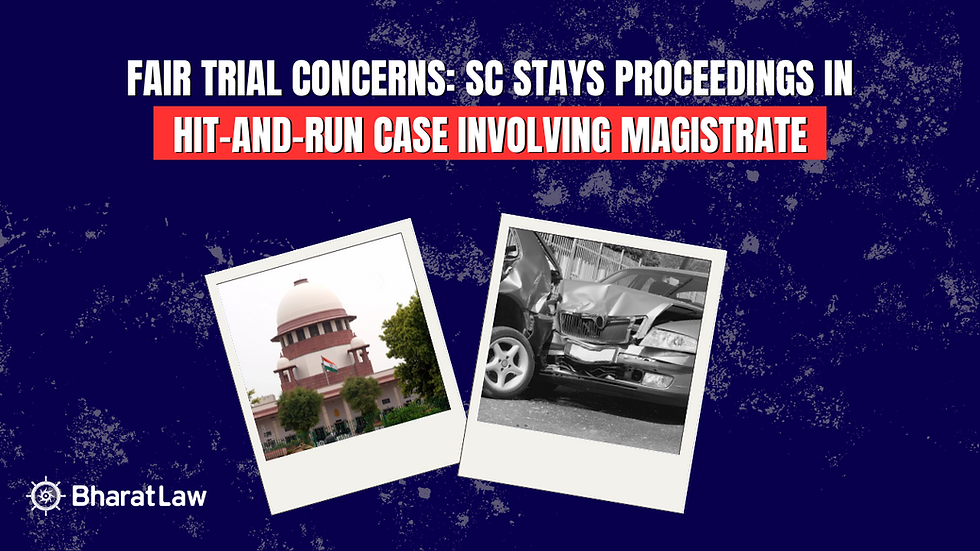As Electoral Transparency Takes Centre Stage, SC Hears IUML’s Challenge to Bond Scheme
- Chintan Shah

- Apr 14, 2025
- 4 min read
As India gears up for the 2024 general elections, the debate over electoral funding transparency has reached a crucial juncture. Just weeks after the Supreme Court struck down the Electoral Bond Scheme (EBS) as unconstitutional, a fresh legal challenge from the Indian Union Muslim League (IUML) is now asking the Court to delay the public release of bond donor information until the elections are over.
At the heart of IUML’s petition is a concern that real-time disclosure of donor names—especially before voting begins—could invite political retaliation and tip the balance of power during a fiercely contested election. With ₹16,000 crore in donations flowing through the EBS since its inception, the stakes couldn’t be higher.
Background: SC Judgment on Electoral Bonds
On 15 February 2024, a Constitution Bench of the Supreme Court declared the Electoral Bond Scheme unconstitutional, citing violations of the right to information and principles of free and fair elections. The Court also directed the State Bank of India (SBI) to submit complete bond transaction data—detailing purchaser identities, bond numbers, and redemption details—to the Election Commission of India (ECI) by 6 March.
Following that, the ECI was instructed to publish this data on its official website by 15 March. The ruling was hailed as a landmark step toward restoring transparency in political funding, especially given that the EBS allowed anonymous donations to political parties, disproportionately benefiting the ruling party.
IUML’s New Petition: What Do They Want?
On 12 April 2024, IUML filed a fresh application before the Supreme Court, not to challenge the core verdict, but to seek a temporary pause on the public release of bond purchaser data until after the Lok Sabha elections.
Their central argument: premature disclosure of donor identities could lead to political vendetta, particularly targeting donors who supported opposition parties. The party also warned of “irreversible consequences” if the data were made public now, asserting that businesses and individuals could face intimidation, loss of contracts, or harassment from central agencies.
Key Arguments Presented by IUML
Risk of misuse:IUML argues that donors who supported opposition parties during the EBS era could face coercive action from the state, including raids and regulatory scrutiny. The party claims this could discourage political funding in the future and violate the democratic right to support any party freely.
Election neutrality at stake:The petition stresses that releasing sensitive donor data just before elections may compromise the fairness of the electoral process. According to IUML, this disclosure could create an uneven playing field by discouraging potential donors and damaging the credibility of non-ruling parties.
Not against disclosure—but against timing:Importantly, IUML is not opposing the Court’s February ruling. Instead, it seeks to delay its execution until after polling concludes. The party maintains that transparency must be balanced with electoral fairness.
Centre’s Response: “No Stay on SC’s Own Orders”
The Union Government, represented by Solicitor General Tushar Mehta, strongly opposed IUML’s plea. In a sharp rebuttal, Mehta stated that “a constitutional court cannot stay its own final judgment” unless there are exceptional circumstances. According to him, the IUML’s arguments are “wholly misconceived”, and the petition essentially amounts to an attempt to undo a landmark ruling under the guise of timing.
He also underscored the importance of immediate compliance with the Supreme Court’s transparency orders, particularly since they were issued to uphold voters' right to know how parties are funded.
Legal Experts Weigh In
The IUML’s plea has sparked intense debate within legal and political circles. While the core judgment enjoys widespread support among constitutional scholars, the question of implementation timing is far more nuanced.
Senior Advocate Prashant Bhushan, who argued against the bond scheme in the original case, commented that any delay in disclosing donor information would effectively defeat the purpose of the judgment. “If voters cannot know before the election who funded which party, then the damage is already done,” he said.
On the other hand, some experts acknowledge the risk of donor harassment, especially in politically polarised environments. “It’s a valid concern, particularly if businesses fear retribution,” noted a senior advocate who wished to remain anonymous. “But it’s also a slippery slope. If we allow disclosure to be delayed once, what stops others from seeking similar exemptions in future elections?”
The Constitutional Dilemma: Transparency vs. Fairness
The SC’s original ruling reaffirmed the voter’s right to information as a fundamental component of free and fair elections. But IUML’s plea puts the Court in a tight spot: does postponing disclosure erode the essence of that right? Or does immediate disclosure risk chilling political participation due to fear of vendetta?
There’s no easy answer. The case may set a precedent on whether execution of a constitutional ruling can be staggered to accommodate political sensitivity—or whether such flexibility undermines the authority of the judiciary.
What Happens Next?
The Supreme Court is expected to hear IUML’s plea in the coming days. The outcome could influence not just the upcoming elections, but also how court judgments on electoral reform are implemented going forward.
If the Court agrees to delay disclosure, it may be seen as prioritising electoral neutrality over judicial immediacy. If it refuses, it will affirm that constitutional compliance cannot be compromised, even for short-term political optics.
Either way, the judgment will send a clear message about the role of courts in navigating India’s increasingly complex electoral landscape.



Comments